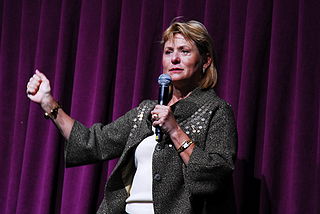A Quote by Douglas Rushkoff
Facebook has never been merely a social platform. Rather, it exploits our social interactions the way a Tupperware party does. Facebook does not exist to help us make friends, but to turn our network of connections, brand preferences and activities over time - our 'social graphs' - into money for others.
Related Quotes
We could not have launched Causes without Facebook Platform, providing real identity and real friends. Facebook Platform was created so that experiences that are inherently social in our off-line lives could be brought online as an authentic expression of who we are; Facebook did this best in revolutionizing photo sharing.
We're being asked to continually be "authentic" and "honest" with the world through social media. There's a demand to post our wedding pictures, baby pictures (only minutes after the birth), our relationship status, and our grief and joys on Facebook and Instagram. Similarly, we construct persona through dating apps and networking sites. All of these social media networks exert pressure on us to share the personal details of our lives with unknown masses. So the pressure on the characters in "Openness" isn't merely romantic, but public/social as well.
I feel like today's culture seeks at every turn to place more and more power in the hands of the individual. Bookstores are lined with shelves filled with self-help books. Facebook, Twitter, Instagram, and every other social media outlets turn our focus inwards, allowing us to fall more and more in love with ourselves, our thoughts, our opinions, our voices.
We live in a society of social networks, with Twitter pages and Facebook, and that’s fine, but we have contact with our work associates, our family, our friends, and it seems like half the time we are more preoccupied with our phone and other things going on instead of the actual relationships that we have right in front of us. Hopefully, people can learn from this and try to actually help if someone is battling something deeper on the inside than what they are revealing on a day-to-day basis.
Rather than protecting music as a sublimely meaningless activity that has managed to escape social signification, I insist on treating it as a medium that participates in social formation by influencing the ways we perceive our feelings, our bodies, our desires, our very subjectivities - even if it does so surreptitiously, without most of us knowning how. It is too important a cultural force to be shrouded by mystified notions of Romantic transcendence.
The Islamic State does not want us to open our doors to their refugees. It wants them to be hopeless and desperate. It does not want us to enjoy ourselves with our families and friends in bars and concert halls, stadiums and restaurants. It wants us to huddle in our houses, within our own social groups, and close our doors in fear.
We want to encourage investors to target businesses that focus on achieving more than just profits - by placing their money into businesses that also positively contribute to social or environmental benefits in Ontario. Angel investors can help social enterprises grow and succeed, and through our partnership with the Network of Angel Organizations and the Impact Angel Alliance, we are making it easier for social ventures and angel investors to connect, contribute, and make our society a better place to live.





































